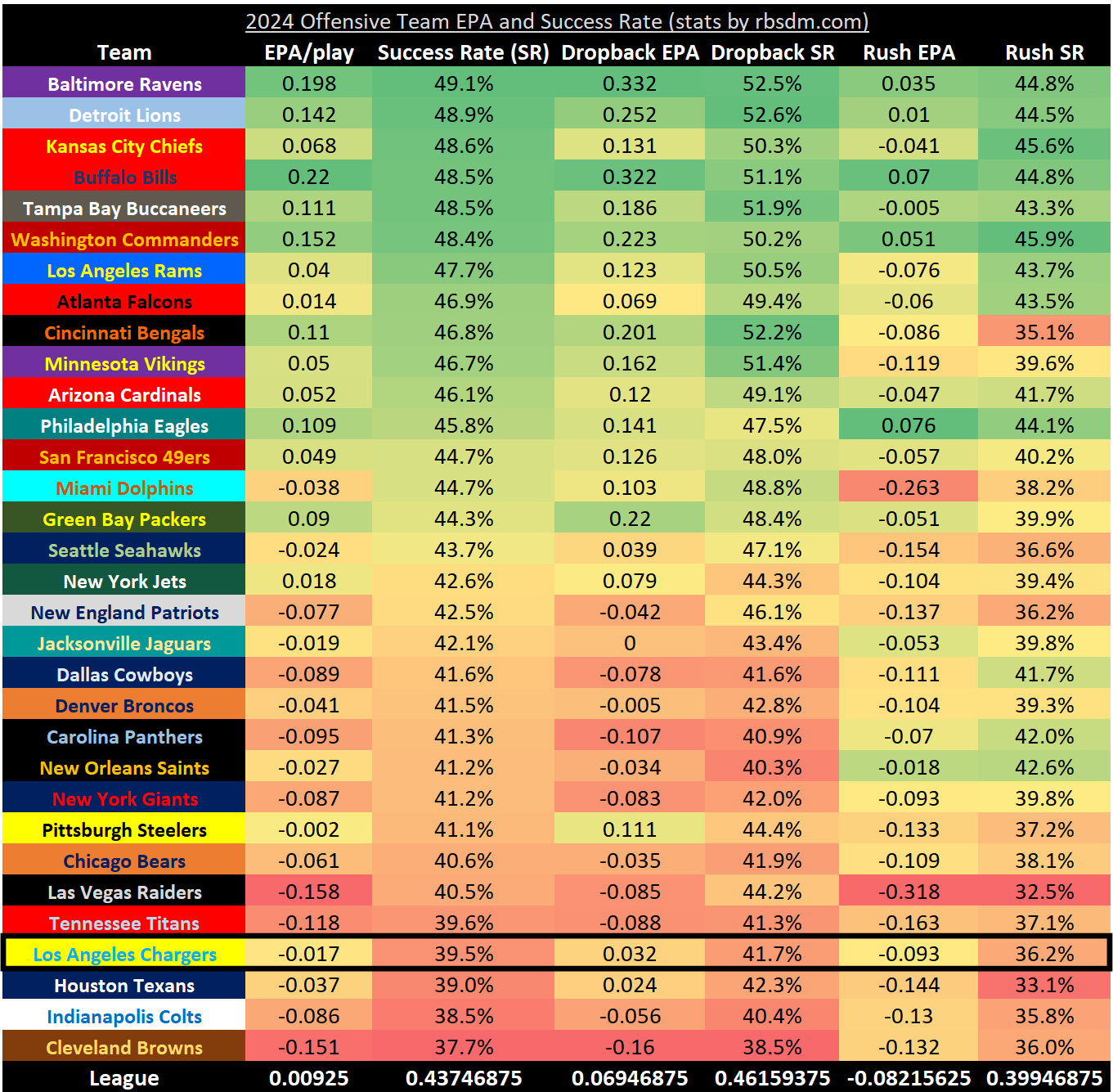
Quick Slant: TNF - A Significant Matchup with Little Fantasy Intrigue
Broncos @ Chargers, Thursday @ 8:15 PM
Thomas Morstead skittered forward to launch it deep and start the second half, but at the last possible instant, his foot swiped sideways, the ball tumbling end-over-end like a stone skipping across water, catching Colts WR Hank Baskett flat-footed and thrusting 88,000 startled eyes wide open in Miami’s cool February air. The surprise onside kick banged off of Baskett’s facemask; Jonathan Casillas fell upon it and, from that moment on, Sean Payton’s Saints sliced through Indianapolis throughout Super Bowl XLIV. And when the clock struck zero, confetti fell in black and gold like plaster off broken walls, and New Orleans stood there in all its bruised glory, fists raised, laughing through tears, because this wasn’t just a trophy, it was a middle finger to every storm that ever dared to drown them.
Almost three years to the day, Jim Harbaugh stood in the dark, 22 points down, chewing on the taste of failure. The Superdome lights blinked out, then sputtered, dragging themselves back to life. He stared at their struggle, willing it to mean something, because, as the lights flickered awake, his 49ers needed to correspond. It started with a spark—Colin Kaepernick turned right and pumped, faked a handoff, then spun and shot a laser to his left; Michael Crabtree was pinned between the velocity of the pass and the errant collision of an oncoming defender, who crumbled to the ground, another sliding over Crabtree’s back. Crabtree was left alone to charge to the end zone, so San Francisco rose from its paralysis, bold and fearless, turning a nap of a game into a classic. At the goal line, salvation hung within reach, but four cracks at immortality came and went. Brother John raised the trophy while Jim stood idly by. Some men win rings forged for such occasions; others are forged by the occasions themselves.
Payton and Harbaugh flowed from their heights like rivers carving paths. They each stepped away from the NFL, only to return and embrace a new chapter filled with possibilities. Already, they have proven their worth. For Harbaugh, his nameless Chargers have exceeded what was expected; for Payton, it was a story set in Denver, begun and then torn from the typewriter, cast aside and replaced by a blank page, a different tale, and a new figure to carry it forward. Thursday, they meet with playoff aspirations on the line, to remind us that they are legends, and legends aren't defined by their failures; they are formed by them.
Broncos’ Implied Team Total: 19.75
Pythagorean Wins is a formula that uses points for and points against to develop an expected wins model. According to the model, the Broncos rank as the sixth-best team in the NFL with just over 11 expected wins.
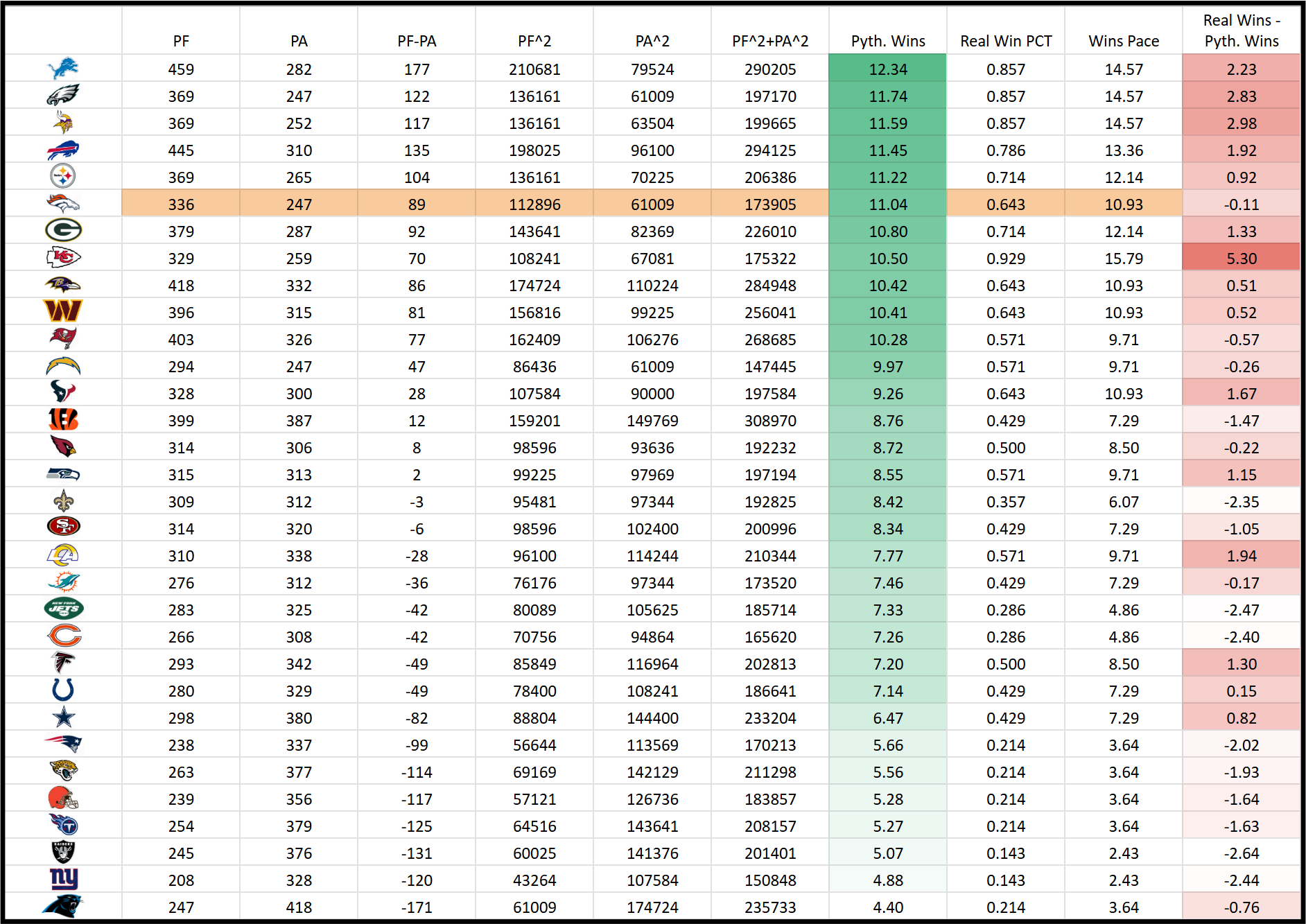
That the company the Broncos keep this December includes Philadelphia, Detroit, Kansas City, and Baltimore would have been shocking to a time traveler springing forward from August. Not much was thought of the Broncos then; they had cut ties with Russell Wilson at a cost of around $85 million in dead money and were set to start the sixth rookie QB taken in the NFL draft, Bo Nix.
The Denver defense is the best in the NFL—we’ll dig a little deeper into that later—and that is another surprising event if we remember that this unit was crushed 70-20 in Week 3 last year. The quality of their defense is a massive part of their story.
The offense is another story, but it isn’t a wasteland either. It ranks 23rd in EPA per play and 21st in offensive success rate. It ranks 22nd in EPA per dropback and 22nd in offensive success rate on dropbacks. Nix ranks 26th in EPA + CPOE composite, 21st in PFF grade, and 26th in QB rating.
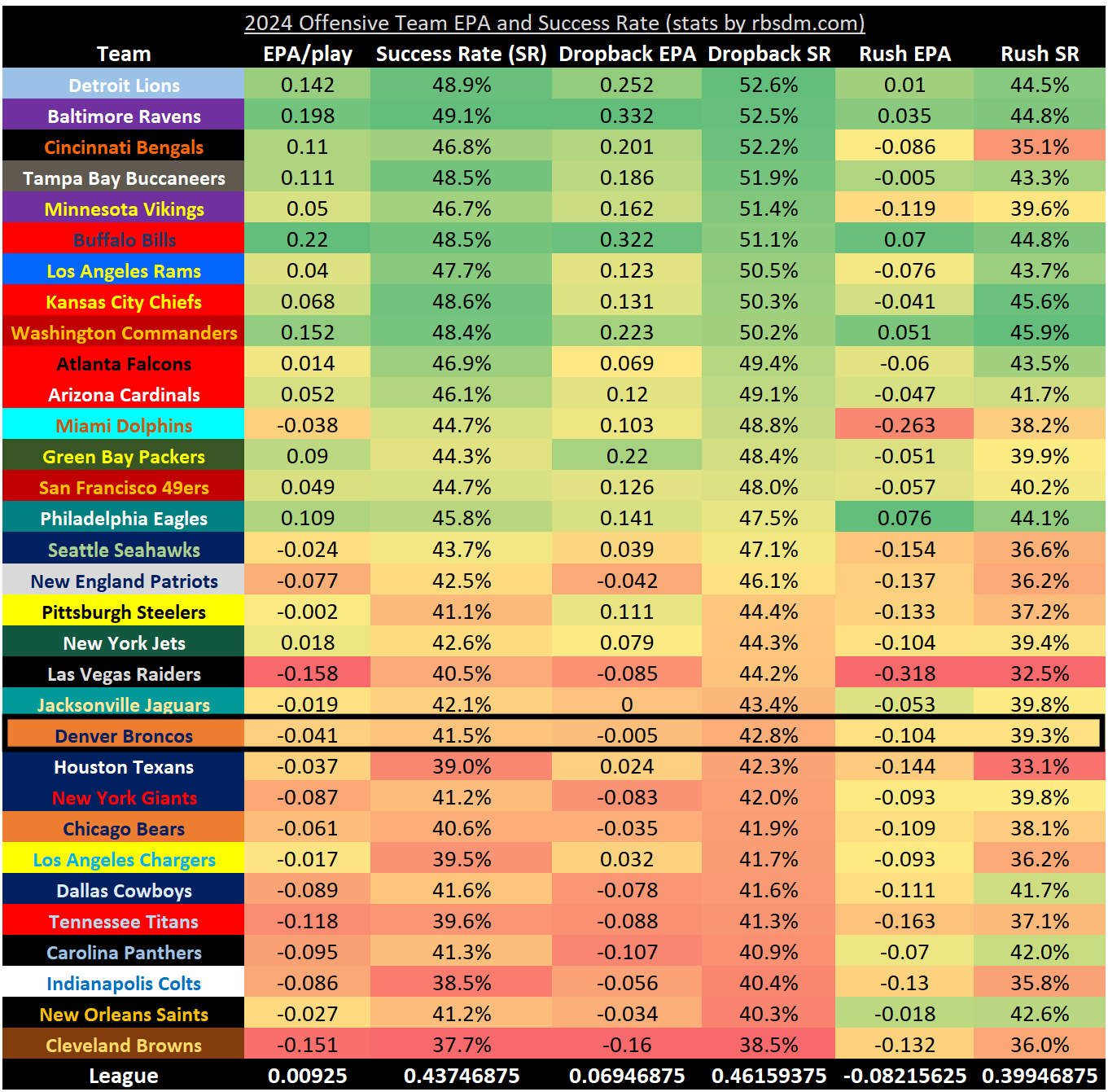
But Nix was a total nothing in the first four games; there were conversations that he should even be benched for Jarrett Stidham. Many raised a legitimate case that he was the worst QB in football. But a switch flipped, and Nix has been a different player since Week 5.
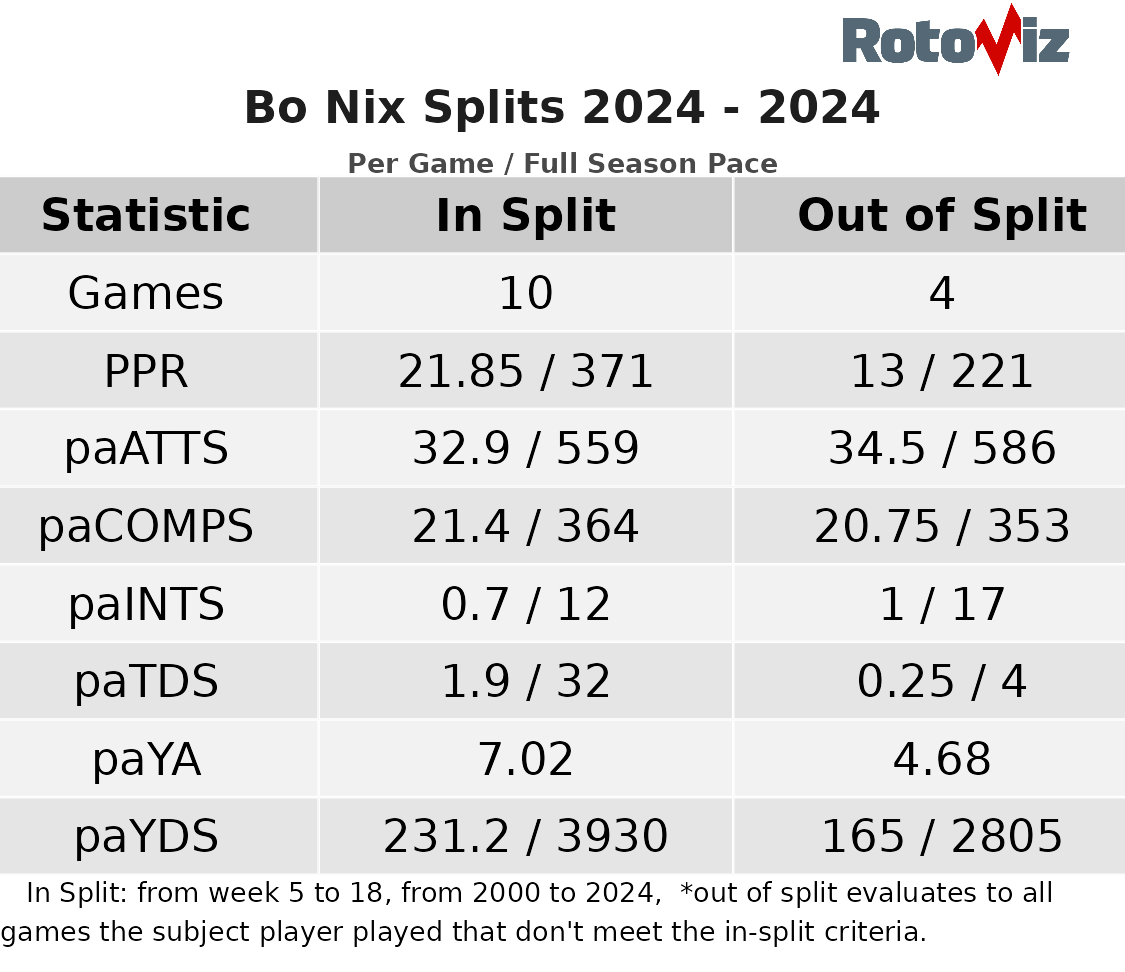
Since then, Nix has ranked seventh in fantasy points. Some of this is owed to his rushing ability; Nix ranks eighth in rushing yardage and is tied for seventh in rushing TDs since Week 5. Still, he can hold his own as a passer, ranking 13th in passing yardage and fifth in passing TDs during this same span. He ranks sixth in EP among QBs since Week 5 as well.
Denver plays fast at the line—tied for fourth from a neutral script at 27.6 seconds to snap. Their neutral pass rate is tied for sixth and their pass rate over expected (PROE) is seventh. They play 64 plays per 60 seconds, around average. Bo Nix is tied for seventh in dropbacks.
The Broncos only have one player with at least a 15% market share in the past six games: Courtland Sutton (28%). The next closest is Devaughn Vele at 13%.
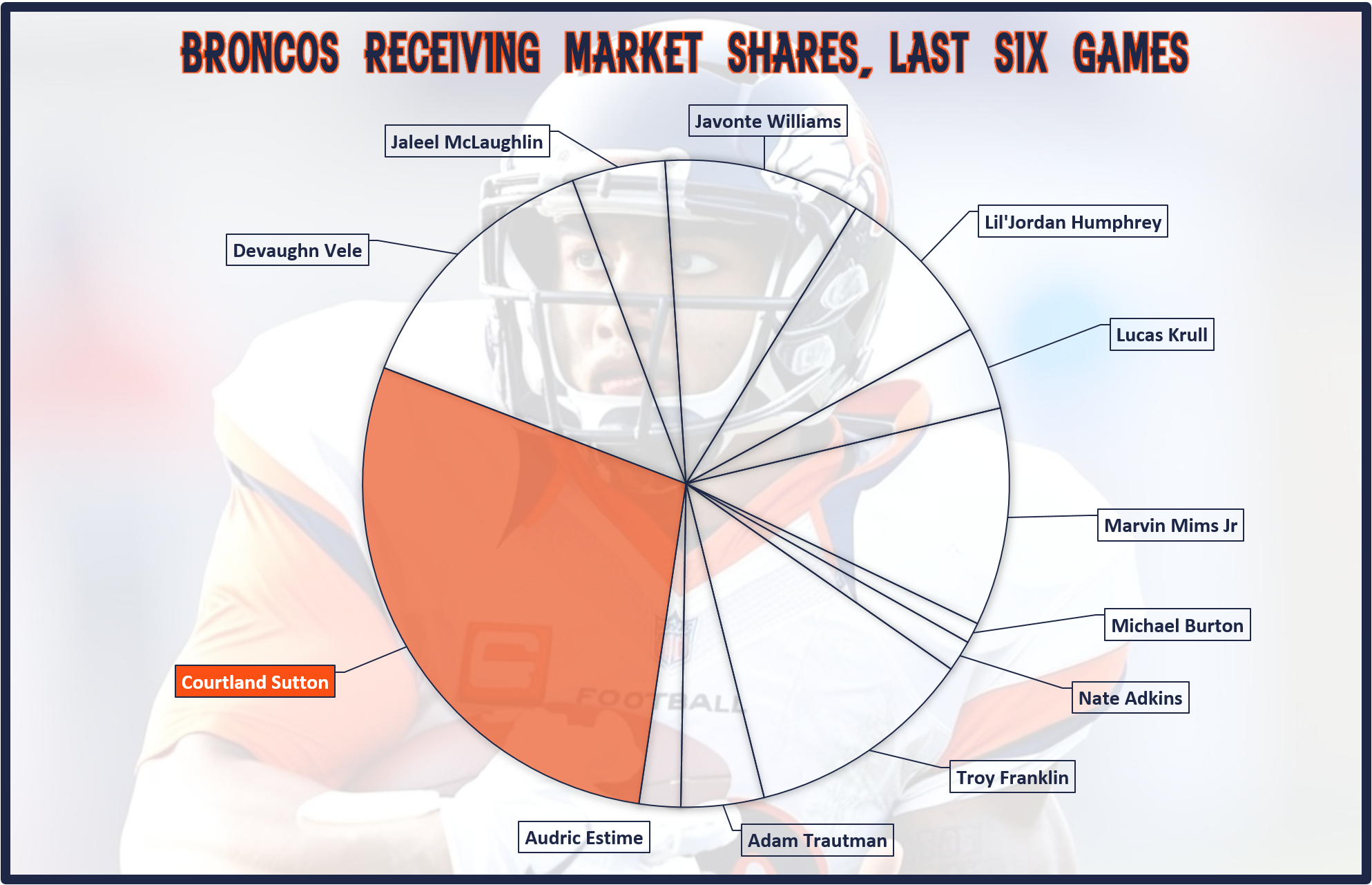
Even with the Broncos’ high pass rate and effectiveness in the passing game, they cannot sustain players with sub-15 % shares for fantasy. During this period, Vele's 13% amounts to 26 total targets, which doesn’t even rank in the top 75 across positions. The only reliable option in the Broncos’ passing game is Sutton, who ranks as the WR12, owning the eighth-most targets, including the seventh-most first-read targets.
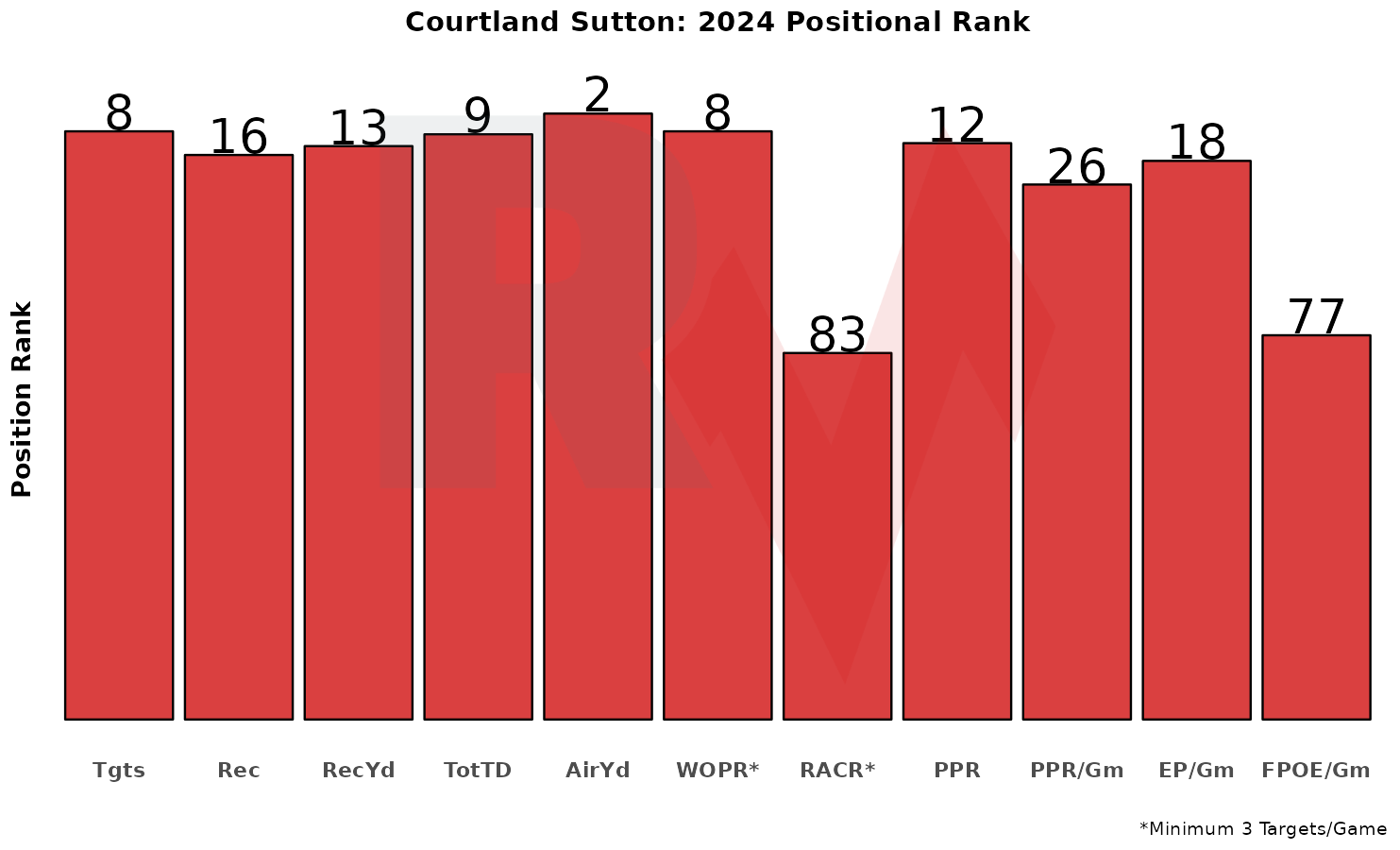
The Chargers run the third-most zone coverage at 77.2%. Like most teams, they use Cover 3 more than any other alignment, but the only alignments they run an inordinate amount compared to league averages are Cover 6 at 10.3%, ranking eighth, and Cover 4 at 23.3%, ranking second.
According to Fantasy Points’ Matchup Expected Fantasy Points model, Nix only ranks 27th this week among QBs against the types and rates of coverages LA utilizes. Among WRs and TEs, the highest-ranking Bronco against the types and rates of coverages the Chargers run is Sutton, who only ranks 37th. These are not overly optimistic data points.
The Chargers’ secondary has been brilliant this season—almost as much as their excellent counterparts. They rank fourth, behind the Broncos, 49ers, and Eagles.
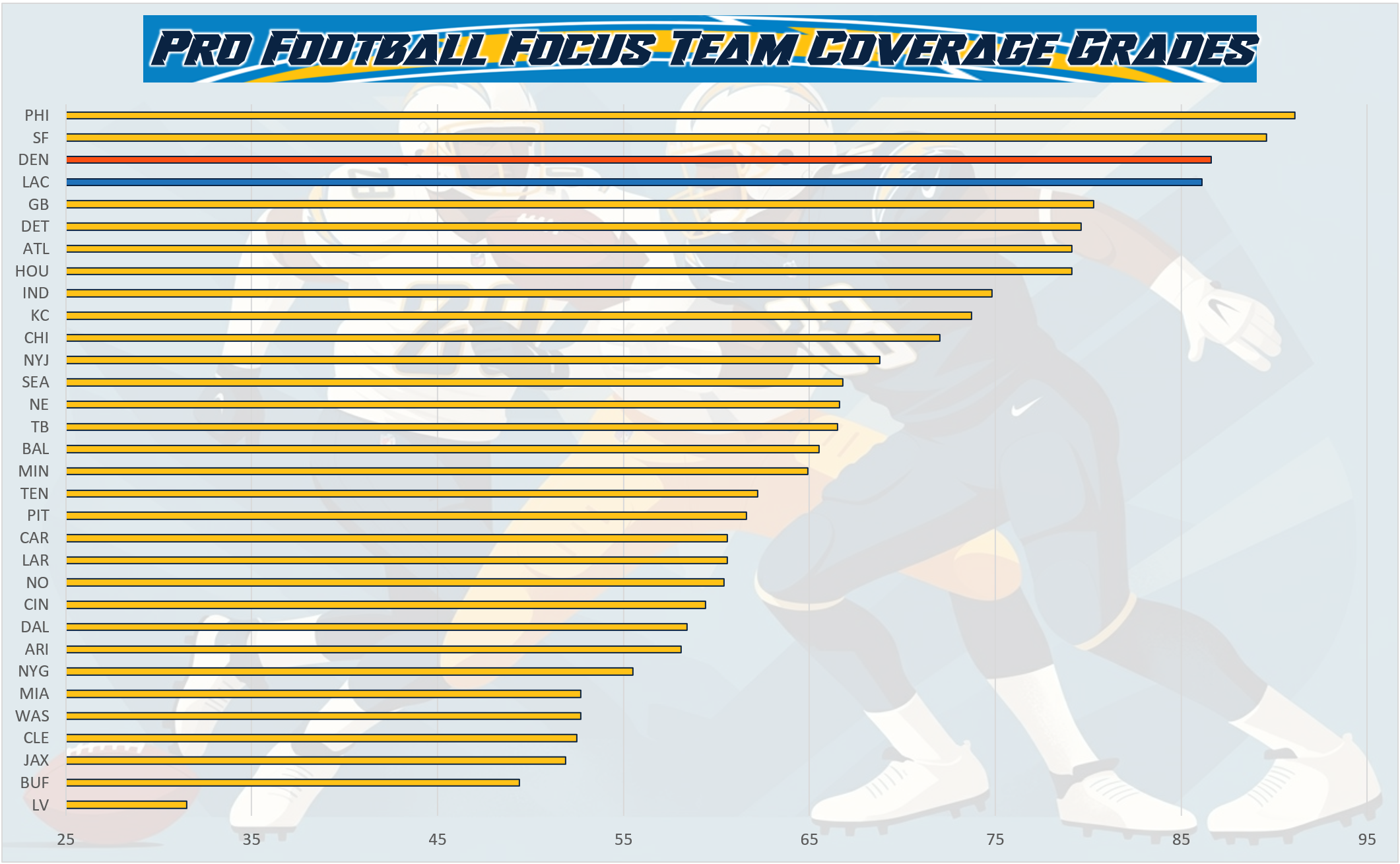
The Chargers’ best defensive back dating back a few years has been Derwin James, who plays a hybrid safety/slot corner role. The betting markets for DROY have overlooked fifth-round corner Tarheeb Still, but he is PFF’s third-highest-graded rookie defender. Once essentially left for dead, Kristian Fulton has had a career renaissance with the Chargers this year. And in the back, Tony Jefferson and Elijah Molden round out the secondary (Molden is doubtful to play). Even without Asante Samuel, on IR with a shoulder injury, the Chargers have been incredible in the defensive backfield, all the way around.
Fulton represents the greatest weakness among the three, but even he presents a tougher assignment than usual. As such, all of Denver’s pass-catchers draw a tougher matchup this week, including Sutton. The Chargers rank seventh in EPA per dropback and defensive success rate on dropbacks.
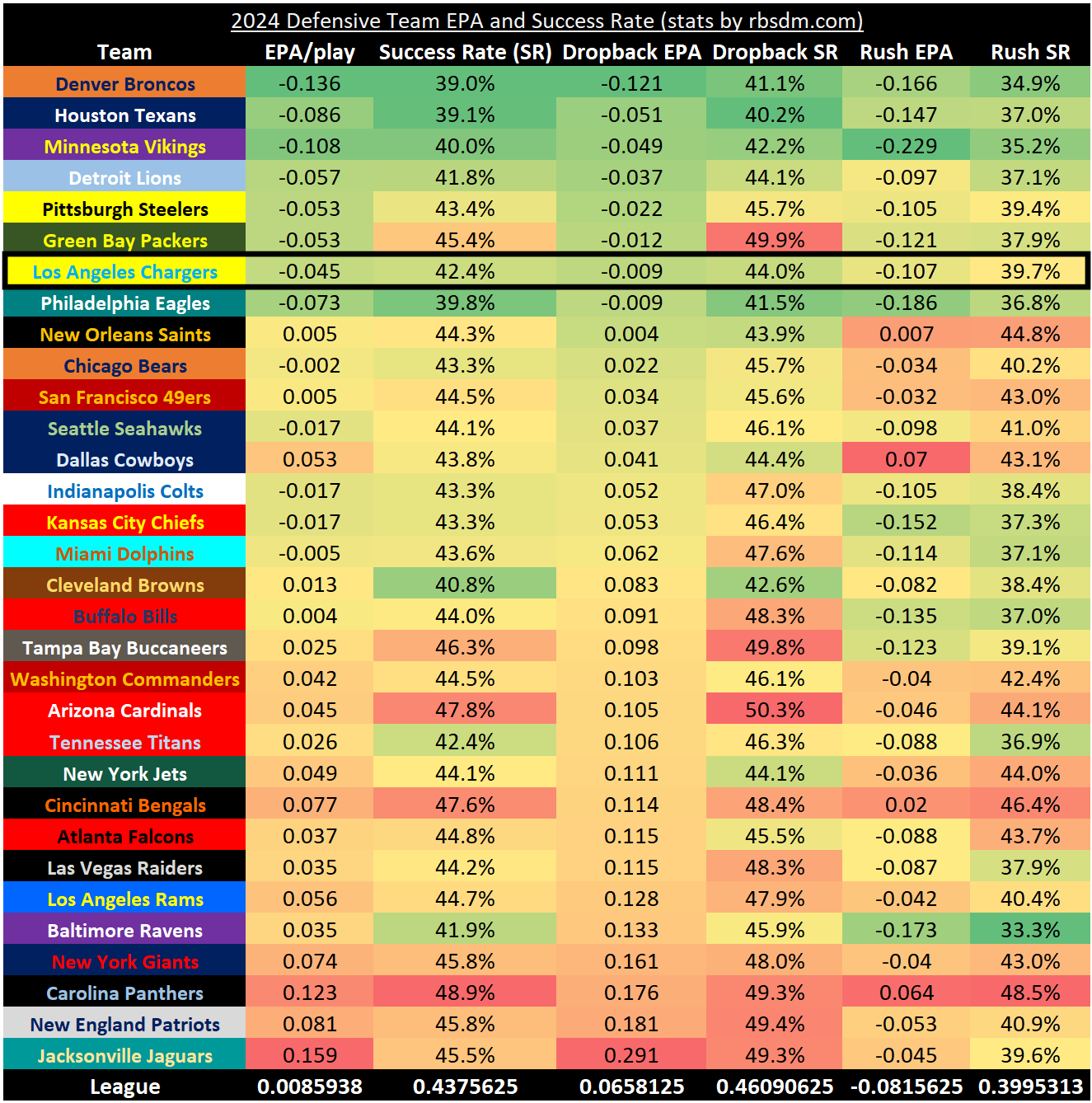
The Broncos rank third in offensive pressure rate over expected (PrROE) allowed at -4.94%. The Chargers rank 22nd in defensive PrROE generated at -0.56%. This is the second-most advantageous pass-blocking situation for any offense in Week 16.
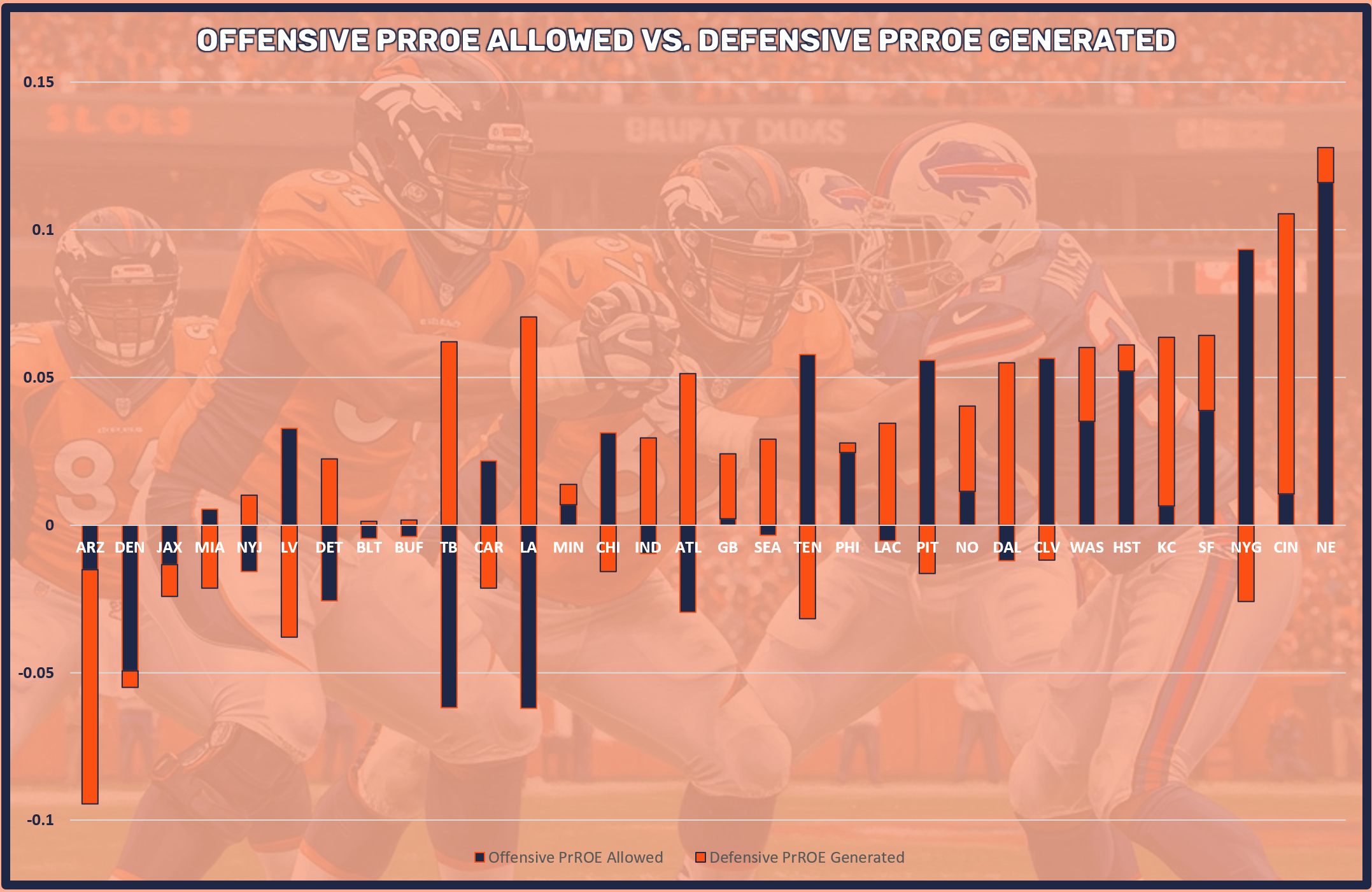
Payton-led teams have traditionally been among the better-rushing teams in the NFL, but the Broncos haven’t gotten strong footing in the running game this year. They are ranked 19th in EPA per rush and 20th in offensive success rate on rushes. Their run blocking has been very average, and their stable of RBs has been frequently underwhelming.
Before the Broncos’ Week 14 bye, there were signs of life from smallish scat-back Jaleel McLaughlin, who made a play for the leading role, but he was immediately hurt upon his return in Week 15 and will be out this week. The same thing happened earlier this year when Tyler Badie summoned more attention only to be knocked out of commission with an injury from which he still has not recovered. The team seems nonplussed with former second-round pick Javonte Williams, who has been an RB2 or better only three times this year.
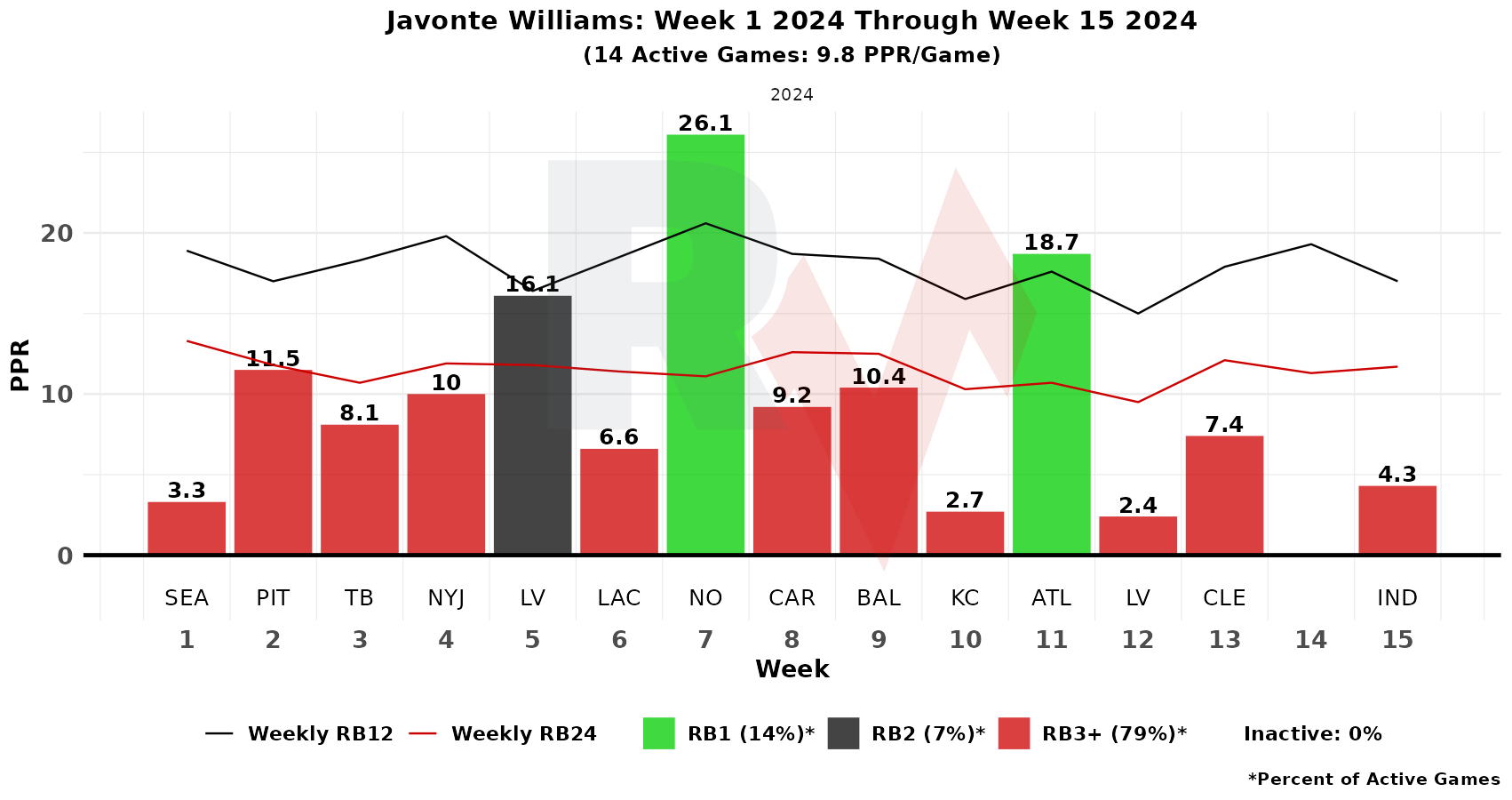
Many will attribute this to injuries, but Williams has always been an inefficient player. The strength of his reputation came on a wave of three-straight RB1 performances in Weeks 12-14 in his rookie year. In 47 career games, he has failed to be an RB1 or RB2 (in other words, he was an RB3 or worse) for 72.3% of his games; he has never had positive FPOE for a season and three times, has recorded an FPOE of -20 or less.

Regardless, Williams could get a shot at a larger workload on Thursday, splitting time with Audric Estime. Playing him in your lineups on the heels of a favorable matchup with the Colts where McLaughlin left early and Williams still netted fewer than five fantasy points will take some titanium tater tots.
The Chargers can be run on. They rank 11th in EPA per rush allowed and 18th in defensive success rate on rushes. In their last five games, they have allowed the eighth-most fantasy points to opposing RBs.
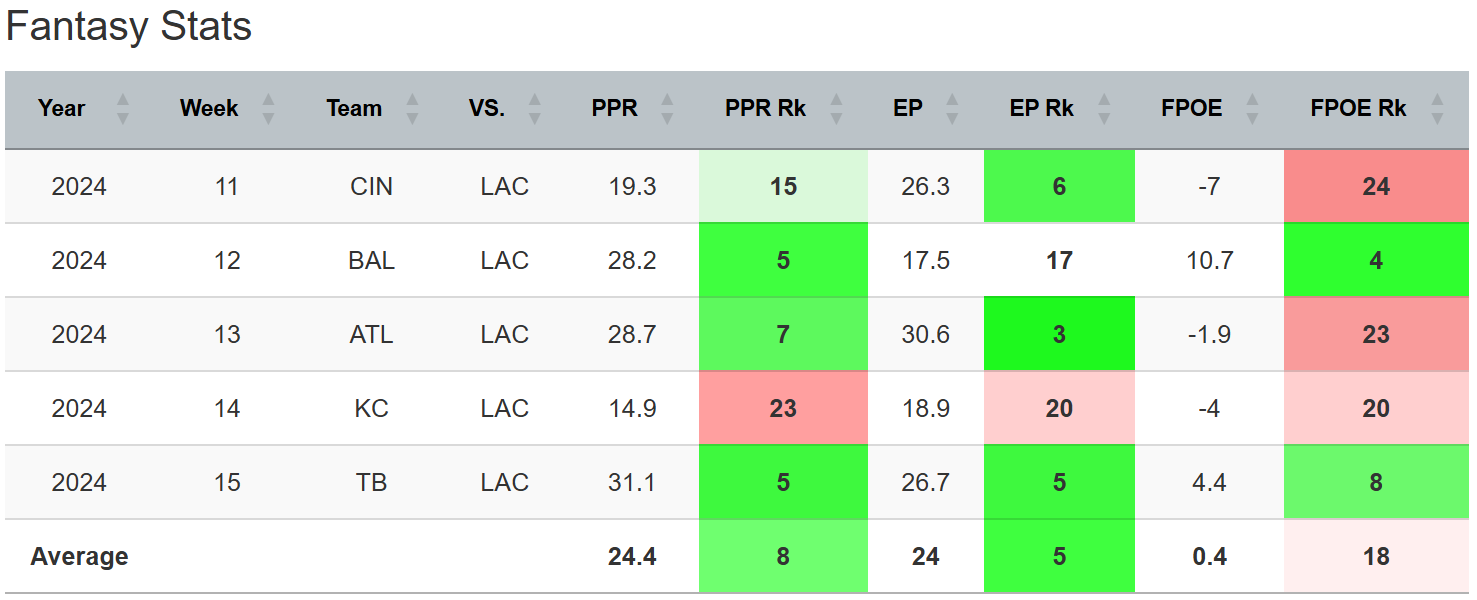
Behind Door No. 2 lies Estime, the rookie from Notre Dame. Estime also has negative FPOE in his limited opportunities and a less robust receiving profile, so playing him would take even more daring. A bet on Estime is nothing more than a contrarian play—a way to short-sell the market on Williams; there is nothing about his performance or performance-related trends that would affirm an upcoming breakout.
Chargers’ Implied Team Total: 22.75
The Chargers rank 17th in EPA per play and just 29th in offensive success rate.
